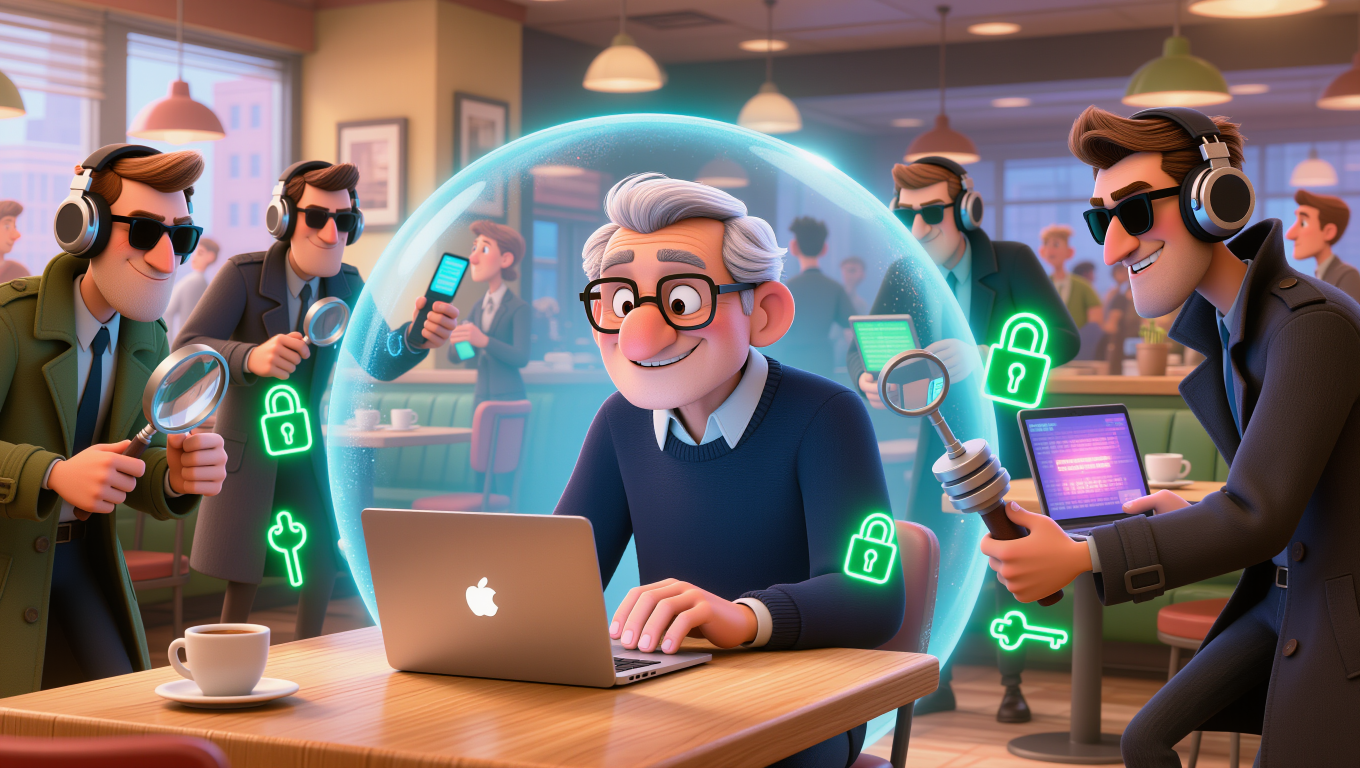Let me tell you a story about internet privacy that might sound familiar.
Imagine you’re sitting in a bustling coffee shop, and instead of quietly whispering your order to the barista, you’re shouting it out loud for everyone to hear. “I’d like a large latte with oat milk!” Now, everyone around you knows exactly what you’re ordering, your name, maybe even which table you’re sitting at.
That’s exactly how your regular internet browsing works – your online activities are essentially being broadcast for anyone nearby to intercept and understand.
The Online Safety Act: A Turning Point for Digital Privacy
In recent months, the UK has witnessed a dramatic surge in VPN usage, primarily driven by the Online Safety Act. This legislation has sparked unprecedented interest in digital privacy protection.
Shocking VPN Adoption Statistics
- Proton VPN reported a staggering 1,400% increase in sign-ups within hours of the Act taking effect
- An additional 5 million age verification checks are now occurring daily in the UK
- VPN downloads have surged as users seek to maintain online privacy and bypass new content restrictions
How VPNs Actually Work: A Real-World Explanation
Now picture a different scenario in that coffee shop. This time, you write your latte order on a piece of paper, carefully fold it into a sealed envelope, and discreetly pass it to the barista. No one else in the coffee shop knows what you’ve ordered, who you are, or where you’re sitting.
That’s exactly what a VPN does for your internet connection.
In technical terms, a VPN creates an encrypted communication pathway. It’s like having a private, secure messenger who takes your online request, wraps it in a protective layer that nobody can see through, and ensures it reaches its destination without revealing your true identity or location.
Without VPN

With VPN

Why VPNs Matter More Than Ever
Think of public Wi-Fi like an open-air café where everyone can overhear your private conversation. When you’re casually checking your bank account on a free café network, you’re essentially broadcasting your financial details to every tech-savvy stranger within digital earshot.
Hackers have gotten clever. They create fake Wi-Fi networks that look exactly like legitimate hotspots – “Free_Cafe_Wifi” or “Airport_Guest” – designed to trick you into connecting. It’s like a digital honey trap, waiting for unsuspecting users.
Without a VPN, you’re leaving your personal details exposed, anyone with a bit of technical know-how could:
- Snatch your login details as easily as listening to a nearby conversation
- Track every website you’re visiting, building a detailed digital profile
- Potentially slip into your personal accounts without you even realizing it
The beauty of a VPN is that it’s like drawing the curtains, creating a private, secure bubble around your online activities. It encrypts your data, making it virtually impossible for digital eavesdroppers to intercept or understand what you’re doing online.
When You need a VPN
- Public Wi-Fi Protection: Using free Wi-Fi at coffee shops, libraries, or airports becomes much safer
- Securing Financial Transactions: Online banking and shopping are protected from prying eyes
- Preventing Digital Tracking: Advertisers and websites can’t build a profile based on your browsing habits
- Navigating Online Restrictions: Access content while maintaining your privacy
Choosing a VPN: What the Savvy User Needs to Know
Picking a VPN isn’t like buying a toaster – it’s more like choosing a digital bodyguard for your online safety. And just like you wouldn’t hire the cheapest security guard, you shouldn’t settle for the first VPN that catches your eye.
Free VPNs are essentially digital yard sales of your personal information. Imagine giving a stranger the keys to your house and hoping they’ll just keep an eye on things. That’s what most free VPNs are doing with your online data.
Paid VPNs are a different story entirely. For about the cost of a nice dinner out – we’re talking £8-£15 a month – you’re getting a robust digital protection service. These aren’t just fancy internet fluff; they’re comprehensive security solutions with multiple server locations, lightning-fast connections, and a team actually invested in keeping your online activities private.
A good VPN is like having a discreet, trusted friend who can:
- Whisper your online requests so nobody else can hear
- Make it look like you’re browsing from different locations
- Keep your digital conversations completely private
- Protect you from digital pickpockets
When choosing a VPN, look for providers that offer multi-device coverage from a single account. This means you can protect your PC, iPhone, Android, Mac, and even Firestick with one subscription – giving you comprehensive protection across all your devices.
Reputable services like NordVPN, Surfshark, and ProtonVPN aren’t just selling a product – they’re offering peace of mind. Don’t just look at the price tag. Look at the reputation, features, and most importantly, how they protect your digital life across all your devices.
A few extra pounds a month is a small price to pay for keeping your online world as secure as your physical one.
Practical VPN Setup and Best Practices
Getting Started
- Research Reputable Providers
- Look for established services like NordVPN, Surfshark, or ProtonVPN
- Check independent reviews and privacy policies
- Installation Process
- Download from official website or app store
- Create a dedicated account
- Install following the app’s wizard
- Enable two-factor authentication
Security Fundamentals
- Use strong, unique passwords
- Regularly update your VPN app
- Use the kill switch feature
- Select servers wisely
Common VPN Myths Debunked
🚫 “VPNs are only for tech experts”
✅ Reality: Modern VPNs are user-friendly and designed for everyone
🚫 “VPNs dramatically slow down your internet”
✅ Reality: Quality VPNs offer minimal speed reduction
🚫 “I have nothing to hide, so I don’t need a VPN”
✅ Reality: Privacy isn’t about hiding; it’s about controlling your personal information
The Bottom Line: Your Digital Bodyguard in an Exposed World
A VPN isn’t just a tool; it’s your digital bodyguard. Understanding VPNs is the next chapter in taking control of your digital life.
In today’s interconnected world, your online activity is like walking through a crowded street with your personal information hanging out of your pockets. A VPN is your digital trench coat – it keeps your sensitive information private, shields you from prying eyes, and gives you the freedom to move around the internet without feeling exposed.
Consider the parallels to how we’ve always protected ourselves. Just as you wouldn’t leave your house unlocked or share your bank statements with strangers, a VPN is about creating a secure perimeter around your digital presence. It’s not about being paranoid; it’s about being smart.
The beauty is in the simplicity. For about the cost of a nice dinner out each month, you’re getting a comprehensive digital protection service. Whether you’re checking your bank account, browsing online, or staying connected while traveling, a VPN provides that extra layer of security that gives you peace of mind.
This isn’t about being tech-savvy; it’s about being smart. It’s about understanding that in the digital age, privacy isn’t a luxury – it’s a necessity. Your online life deserves the same protection you’d give your physical world.
So take that first step. Start small, learn continuously, and gradually build your digital confidence. Your future self will thank you for being proactive about your online security.



Leave a Reply